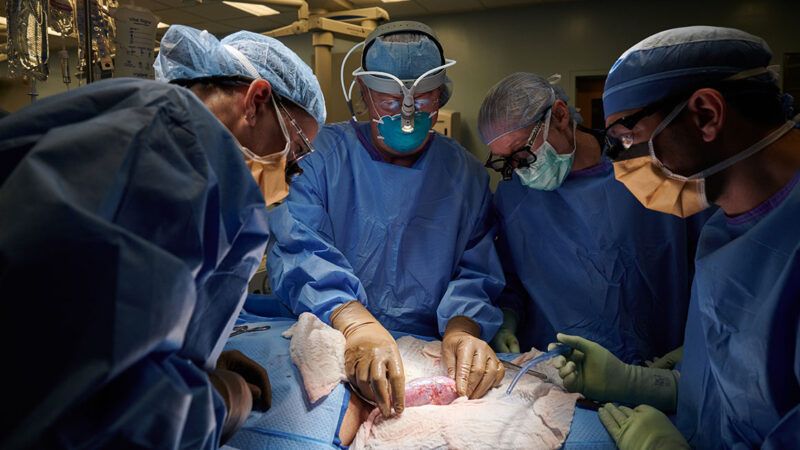One Step Closer to Kidney Transplants From Pigs
Researchers are making great progress overcoming the problems that have long plagued attempts at xenotransplantation.

Nearly 107,000 Americans are waiting for a lifesaving organ transplant; 90,000 of them are hoping for a kidney. The demand for organs clearly exceeds the supply.
In October, transplant surgeons at New York University (NYU) took a small but significant step toward addressing this shortage with organs from other species. They transplanted a kidney from a pig that had been genetically modified to not express the carbohydrate alpha-gal, which occurs in all mammals except humans and other primates. Because infants develop antibodies to alpha-gal in response to gut microbiota, transplants from other mammals provoke a devastating immune rejection.
The NYU surgeons attached the modified pig kidney to blood vessels in a deceased woman's upper leg (with the permission of her family). Her bodily functions were maintained with a ventilator. Researchers observed the kidney for 54 hours. It functioned normally, producing urine and waste products like creatinine, with no signs of immune rejection.
In July 2021, a Massachusetts General Hospital transplant team reported the results of an experiment involving kidneys from pigs that had been genetically modified even more extensively. These pigs do not express alpha-gal or two other carbohydrates attacked by the human system, and they carry several human genes that regulate immune response and blood coagulation. The researchers transplanted kidneys from the pigs into macaque monkeys. While one died after two days, three others lived 135, 265, and 316 days.
These researchers are trying to overcome a problem that has long plagued attempts at xenotransplantation, or procedures involving human recipients but nonhuman tissues or organs. In the early 1960s, for example, Tulane University surgeon Keith Reemtsma transplanted chimpanzee kidneys into 13 patients. Most failed within four to eight weeks, although one lasted for nine months before the patient died. In 1985, Loma Linda University Medical Center heart surgeon Leonard Bailey transplanted a baboon heart into "Baby Fae," who had been born prematurely with a fatal heart defect. Acute immune rejection caused the heart to fail after 20 days.
University of Alabama transplant surgeons David Cooper and Hidetaka Hara suggested in a September EBioMedicine article that "patients who are unlikely to live long enough to receive a kidney from a deceased human donor would benefit from the opportunity of a period of dialysis-free support by a pig kidney." That would help perfect the use of animal organs for transplantation.
In 1995, Cambridge University transplant surgeon Roy Calne suggested that xenotransplantation "is just around the corner, but it may be a very long corner." The NYU results suggest scientists are getting closer to rounding it.


Show Comments (35)